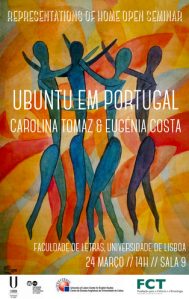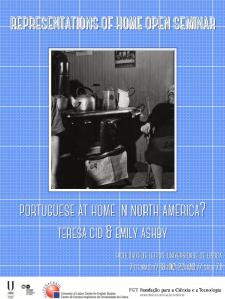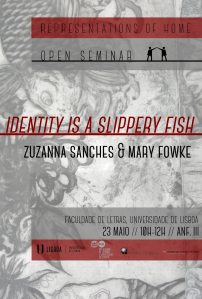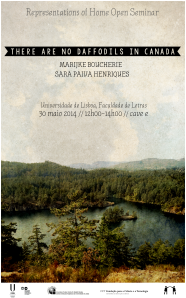REPRESENTATIONS OF HOME 2
Conflict and/or (Be)longing: Thinking with Stories and Images
Venue: School of Arts and Humanities, University of Lisbon, 16-17 November 2017
People not only think about stories; far more consequentially, people think with stories.
Arthur W. Frank, Letting Stories Breathe: A Socio-Narratology, 2010: 47.
The idea of home was something they lived so completely that they would have been at a loss to
define it. But they would have known to be inadequate phrases such as: ‘It’s where you’re from,’
‘It’s the place you live,’ ‘It’s where your family are.’
Deirdre Madden, One by One in the Darkness, 1996: 75.
In a world deeply marked by conflicts, persecutions, and scarce and/or poorly distributed
resources, where some are driven out of their homes by war and poverty, while others feel
that their (national) homes and ways of living are under threat, it is important to reflect
about the notions of home that underpin personal and communal behaviour.
This conference focuses on representations of home in literature and the visual arts as the
site where dynamics of conflict and/or (be)longing are played out. Home, particularly the
imagined home, is a quintessential space of refuge from an external, unknown and
potentially threatening, but also enticing, world. In Classical as in religious texts, home is
both a place of departure and of quest and arrival, and throughout history the longing for
home has persisted in the midst of the recurring challenges of belonging. Conflict has
also elicited concerted efforts to find viable frameworks for coexistence, as epitomized by
the Universal Declaration of Human Rights (1948), in the wake of the Second World
War, or the Paris Agreement on Climate Change (2016), in response to current concerns
about our collective home.
If homes are often sites of tension and conflict, to what extent does the imagined home
shape, and to what extent is it shaped by, our experience of homes?
We invite contributions that reflect on representations in literature and the visual arts of
the experience of home, the longing for home and the challenges of belonging. Topics
addressed may include but are not limited to:
• Home as a space of conflict and/or reconciliation;
• The challenges of (non)belonging;
• Home, community and the representation of gender identity;
• Longing for home and utopia;
• Home and exile;
• Home as refuge / seeking refuge from home;
• Home as prison / home at war;
• Home and trauma;
• Home and family;
• Home and nation;
• Home and language;
• Home and cosmopolitanism;
• Glocal homes / identities;
• Home and nature;
• Home and memory;
• Home and spirituality;
• Home and creativity;
• Home, objects and affect;
• Home and myth;
• Home in folktales and fairy tales.
The conference language is English. Speakers should prepare for a 15-minute
presentation followed by questions. Please send a 250-word abstract, as well as a brief
biographical note (100 words) to rephome@letras.ulisboa.pt by the 15th May 2017.
Proposals should list the paper title, name, institutional affiliation, and contact details.
You will receive notification of abstract acceptance or rejection by the 30th June.
Fees: € 100
Early bird (by 8 September) — € 80
Students (ID required) — € 40
Attendants without presentation who wish to avail of conference documentation — € 15
The registration fee includes coffee breaks and conference documentation.
Details about payment will be provided in due course.
Organising Committee:
Teresa Casal
Ana Cristina Mendes
Ana Raquel Fernandes
Jean Page
Margarida Pereira Martins
Maria Luísa Falcão
Mariana Pires
Marjike Boucherie
Mary Fowke
Paula Horta
Sara Paiva Henriques
Zuzanna Sanches
Scientific Committee:
Teresa Casal
Ana Cristina Mendes
Ana Raquel Fernandes
Isabel Alves
José Pedro Serra
Margarida Pereira Martins
Marjike Boucherie
Maria de Jesus C. Relvas
Paula Horta
Zuzanna Sanches




